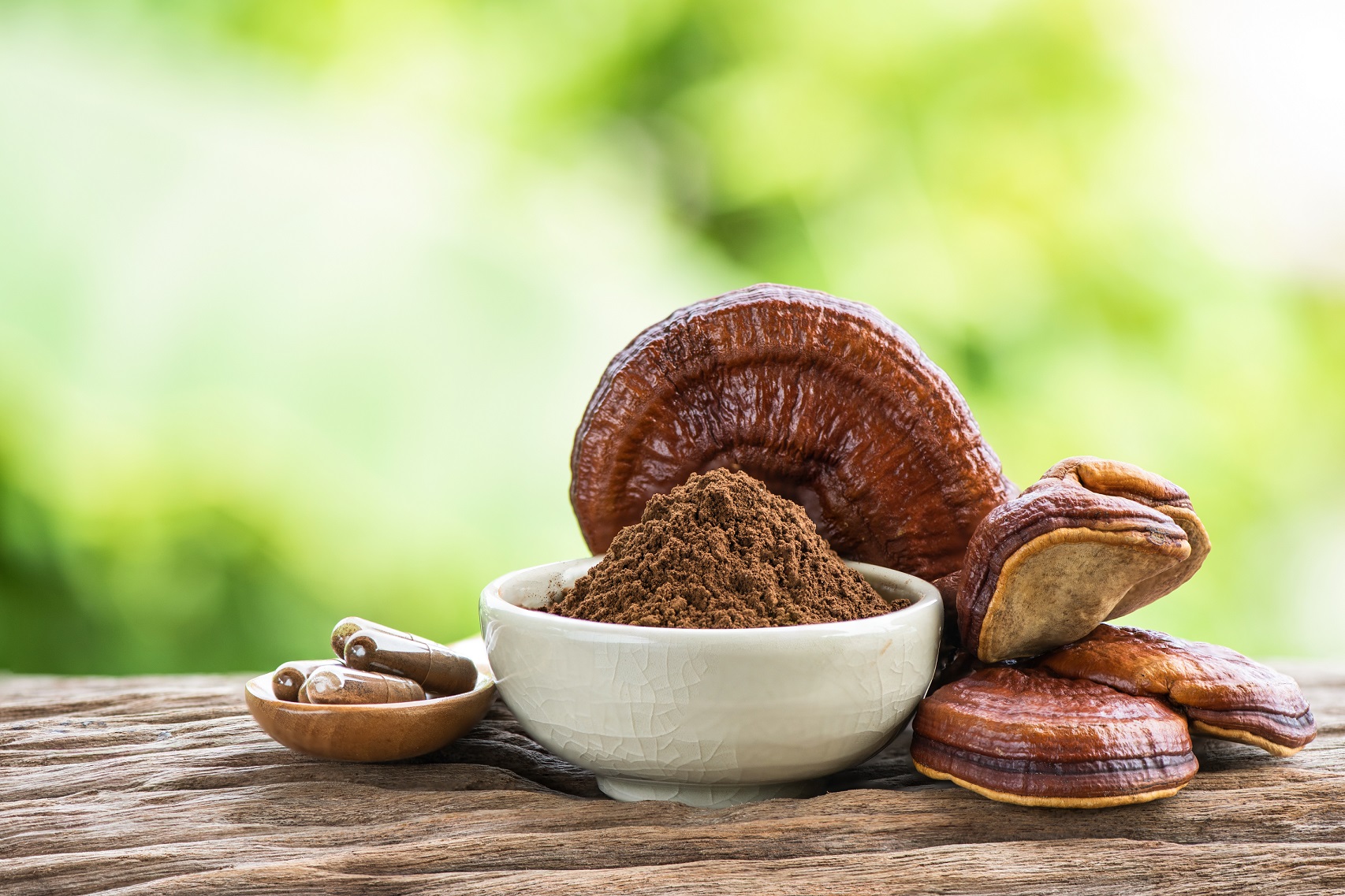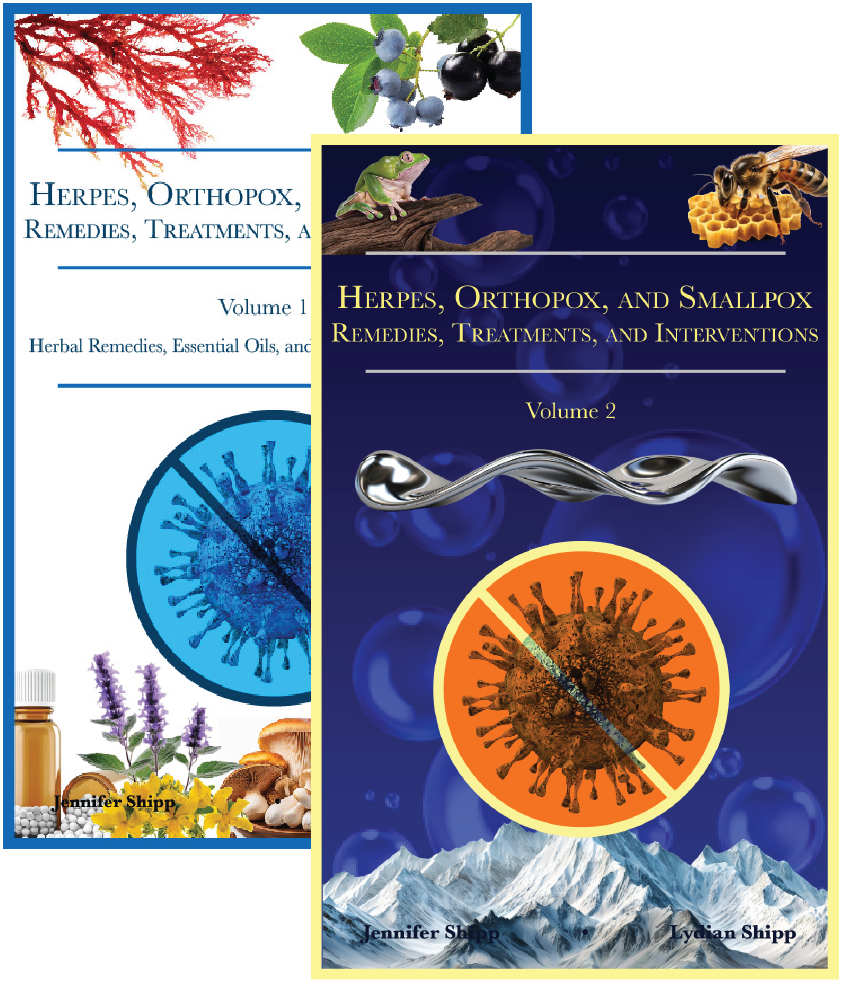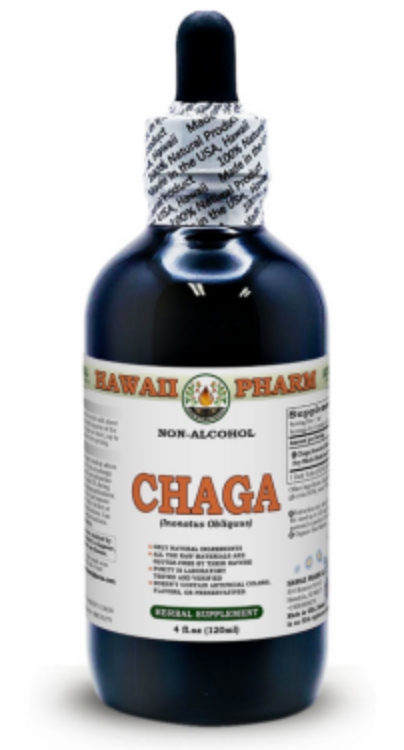 Medicinal Mushroom Therapy for HSV-1, HSV-2, and Other Herpesviruses
Medicinal Mushroom Therapy for HSV-1, HSV-2, and Other Herpesviruses
Medicinal mushroom therapy is a huge topic. There are many, many different kinds of medicinal mushrooms, and although most medicinal mushrooms do have some things in common (given that they’re all, after all, mushrooms), there are also a lot of differences. While all plants have some things in common in regard to treating disease as well, we acknowledge that herbs are all quite different from each other. Medicinal mushrooms are also all quite different. In this article, I’ll focus primarily on the most important medicinal mushrooms for treating herpesvirus infections; other honorable mentions will be included at the end, however, since I’m aware that our readers may have access to different mushrooms depending on the area of the world they live in.

Agaricus spp. Mushrooms for Herpes
Agaricus species mushrooms make up a fairly large grouping of mushrooms, including common culinary mushrooms like the button mushroom (Agaricus bisporus) and the field mushroom (Agaricus campestris). One study found that polysaccharides and other compounds from different wild Agaricus species mushrooms, like proteins and glycoproteins, melanins, and nucleosides, may have antiviral activity in humans. This study specifically observed antiviral effects of Agaricus mushrooms against HSV, West Nile virus, Influenza, HIV, hepatitis viruses, SARS-CoV-2, and orthopoxviruses, like the variola virus.One animal study utilized sulfated polysaccharides from the Agaricus brasiliensis mushroom, otherwise known as almond mushroom (due to its sweet flavor and almond-like scent), as a treatment for HSV-1 and HSV-2 infection. To be more specific, the MI-S polysaccharide was used in these studies. Researchers found that neither oral nor topical administration of the MI-S polysaccharide was able to treat ocular HSV infection (in contrast with other substances, like fucoidan, which was effective for treating ocular HSV when administered orally). Topical application of the MI-S polysaccharide also did not affect cutaneous HSV infection. However, oral administration of 2mg/day of MI-S did result in significantly lower disease scores after 9 days of treatment in mice infected with cutaneous HSV infections.
Intravaginal administration of MI-S 20 minutes prior to introduction of the HSV virus was able to reduce the incidence of genital herpes infections in mice. Thus, this could suggest a potential option for supporting the prevention of HSV infection in at-risk women specifically. A single dose of 500mcg of MI-S in mice infected with HSV-2 genital herpes was also found to reduce mortality by 50%.
 Buy Agaricus blazei (syn. A. brasiliensis) Mushroom Extract Capsules at this link.
Buy Agaricus blazei (syn. A. brasiliensis) Mushroom Extract Capsules at this link.
Agaricus Mushrooms for Viral Hepatitis
A Chinese study found that extracts of Agaricus brasiliensis effectively decreased levels of aspartate aminotransferase and alanine aminotransferase in cases of infection with the hepatitis B virus, thus indicating that this particular Agaricus mushroom may help normalize liver function in patients with hepatitis B infection.Agaricus bisporus, the humble button mushroom, was studied in Spain in regard to its effects against the hepatitis C virus. In this study, ethyl acetate, dichloromethane, and n-hexane extracts of A. bisporus were found to inhibit the hepatitis C virus by between 64.85-75.56% in vitro. A different Spanish study found that water extracts of A. bisporus were also effective against the hepatitis C virus.
Agaricus Mushrooms for Other Viral Infections
Other research suggests that some Agaricus mushrooms may also be effective antiviral treatments for poliovirus. In fact, Agaricus brasiliensis ethanol extracts were shown in one in vitro study to produce between 50-88% viral inhibition of the poliovirus.In a human study done in Ghana, A. brasiliensis was one of a few different medicinal mushrooms that was found to increase CD4+ and T-lymphocyte counts in patients with HIV after 60 days (other mushrooms used in this study were Reishi, Shiitake, Turkey Tail, Cordyceps, and Maitake).
Chaga Mushroom for HSV Infection
Chaga (Inonotus obliquus) is a well-known medicinal mushroom with antiviral effects against the HSV virus. Inonutus obliquus also has exhibited antiviral activity against HIV-1, the H5N6 strain of Influenza-A virus, and SARS-CoV-2 (against COVID-19, aqueous extracts of Chaga produced 50% viral inhibition). A related mushroom, Inonutus hispidus, also has activity against the Influenza-B virus.One in vitro study found that aqueous extract of Chaga effectively decreased the presence of HSV without causing harm to Vero cells. In this study, Chaga’s main mechanism of action against HSV was in the early stages of viral infection; aqueous extract of Chaga can prevent viral entry into cells by acting against viral glycoproteins, thus inhibiting virus-induced membrane fusion.
 Support our outside vendors - Buy Hawaii Pharm's Chaga Mushroom tincture here.
Support our outside vendors - Buy Hawaii Pharm's Chaga Mushroom tincture here.
Reishi Mushroom for Herpes and Other Viral Infections
Reishi mushroom is perhaps one of the most commonly discussed mushrooms when it comes to the immune system and infectious disease. Indeed, Ganoderma lucidum contains some potent compounds that can treat both viral and bacterial infections. Constituents found in Reishi mushroom have been found to act against various viral infections, including against HSV, Epstein-Barr virus, HIV, Influenza and Parainfluenza viruses, poliovirus, vesicular stomatitis virus (VSV), COVID-19 (SARS-CoV-2), Newcastle Disease virus, and the hepatitis B virus. Outside of its activity as a treatment for infectious disease, Reishi mushroom has also been used as a treatment for hepatopathy, nephritis, chronic hepatitis (viral and non-viral), chronic bronchitis, gastric ulcers, hypertension, cancer and tumors, and more.An in vitro study utilized two water-soluble polysaccharides found in Reishi mushroom, a neutral protein-bound polysaccharide (NPBP) and an acidic protein-bound polysaccharide (APBP) extracted specifically from the mushroom’s carpophores, to assess this mushroom’s effects against HSV-1 and HSV-2. The APBP ultimately exhibited more powerful activity against both strains of HSV. This polysaccharide was found to act as an antiviral against HSV by inhibiting viral attachment to Vero cells by up to 50%, as well as by preventing viral penetration into healthy Vero host cells. Researchers concluded that this indicated that the APBP must bind with HSV-specific glycoproteins that promote viral attachment to and penetration into host cells.
Other studies regarding the use of Reishi as a herpes treatment suggest that proteoglycans from Reishi may also be effective against HSV-2 specifically.
Multiple in vitro studies have shown that Reishi is effective against Influenza-A viral strains in particular. In most of these studies, either water-, methanol-, or ethanol-based extracts were used, often made from the carpophores of the Reishi mushroom.
As a treatment for hepatitis B in human patients, the administration of Reishi polysaccharides at a dose of 5400mg/day for 12 weeks effectively reduced serum HBV DNA as well as hepatitis B E antigen (HbeAg) levels.
 Buy Hawaii Pharm's Reishi Glycerite Tincture Here.
Buy Hawaii Pharm's Reishi Glycerite Tincture Here.
Turkey Tail Mushroom for Herpes (...Including for HSV-2 Infection During Pregnancy)
The Trametes versicolor mushroom has antiviral activity against HSV, as well as against some strains of Influenza-A, including H1N1, H3N2, and H5N1. According to an in vitro study on the antiviral effects of Basidiomycete mushrooms, Turkey Tail mushroom extracts can significantly inhibit HSV-2 viral replication in RK-13 cells. In fact, Turkey Tail had the most potent antiviral effects against HSV-2 of all the Basidiomycete mushrooms included in this study. Turkey Tail mushroom similarly had the most significant antiviral properties against the H1N1 Influenza-A virus strain.Multiple studies have also successfully shown that not only is Turkey Tail mushroom a powerful antiviral treatment, it’s also quite safe for human consumption, even at higher doses. It has even been shown to effectively stop or reduce the frequency of HSV-2 outbreaks in pregnant women in some clinical, human trials.
 Click here to buy Hawaii Pharm's Turkey Tail Mushroom tincture.
Click here to buy Hawaii Pharm's Turkey Tail Mushroom tincture.
Cordyceps Mushroom for Shingles
Cordyceps is a medicinal mushroom with antiviral, anti-inflammatory, and immune stimulating effects in the body. Some sources recommend applying Cordyceps mushroom topically to painful areas affected by shingles-related skin rash or arthritic symptoms (Reishi may also be valuable to apply topically for this purpose). Applied topically, Cordyceps mushroom may help reduce pain and the appearance of a shingles skin rash. Click here to buy Hawaii Pharm's Cordyceps Tincture.
Click here to buy Hawaii Pharm's Cordyceps Tincture.
Shiitake Mushroom for HSV-1 and HIV
Shiitake mushroom, otherwise known as Lentinus edodes, is a popular culinary mushroom with numerous medicinal benefits. Studies have found that not only does Shiitake have potent antiviral activity against HSV-1 specifically, but it may also act against the HIV virus. One study found that the administration compounds from Shiitake mushroom effectively blocked the release of HSV-1 particles from infected cells and inhibited HSV-1 induced cell fusion. The treatment effectively treated HSV-1 infection without harming healthy cells. In the treatment of HIV, administration of Shiitake mushroom compounds may help prevent virus-induced giant cell formation.Other research has also shown that Shiitake mushroom has antiviral activity against hepatitis C virus (HCV), H1N1 Influenza-A virus and other Influenza and Parainfluenza viruses, HIV (specifically HIV-1), the Sendai virus (a respiratory virus found in animals), infectious hematopoietic necrosis virus (IHNV), poliovirus, and vesicular stomatitis virus (VSV).
 Buy Shiitake Mushroom Tincture from Hawaii Pharm Here.
Buy Shiitake Mushroom Tincture from Hawaii Pharm Here.
Oyster Mushroom (Pleurotus ostreatus) and King Tuber Mushroom (Pleurotus tuber-regium) for Herpes and Other Viral Infections
As an antiviral agent, Oyster mushroom has action against HSV, as well as against hepatitis C virus (HCV), hepatitis B virus (HBV), the H1N1 Influenza-A strain (and other Influenza and Parainfluenza strains), poliovirus, vesicular stomatitis virus (VSV), and SARS-CoV-2 (COVID-19).One study found that mycelial extracts of Oyster mushrooms can significantly inhibit viral replication of HSV-2 in RK-13 cells. Other research also indicates that Oyster mushroom mycelium demonstrates significant antiherpetic activity in vitro; in fact, the Oyster mushroom was shown to be almost 13 times more effective as an antiviral against herpes virus than against Influenza (thus suggesting its powerful anti-herpes action). Best of all, the selectivity index for Oyster mushroom is high, meaning that it can be administered even at higher doses without causing harm to healthy cells in the body.
The King Tuber mushroom, a common culinary mushroom closely related to Oyster mushroom, has antiviral activity against HSV-1 and HSV-2, as well as against Influenza-A and respiratory syncytial virus (RSV).
 Buy organic oyster mushroom powder here.
Buy organic oyster mushroom powder here.
Maitake (Grifola frondosa) for HSV-1
The GFAHP protein found in extracts of Maitake mushroom is specifically effective against HSV-1. It may also have relevance in treating other types of herpesvirus infection, as well as poliovirus, vesicular stomatitis virus (VSV), HIV, hepatitis B virus, SARS-CoV-2 (COVID-19), and enterovirus-71.Research has found that Maitake mushroom may help increase CD4+ and T-lymphocyte counts in patients with HIV after 60 days of medicinal mushroom therapy. A Chinese study reported that Maitake extracts were able to inhibit the hepatitis B virus by up to 50%. A different Chinese study found that heteropolysaccharide from Maitake mushroom was also able to effectively suppress viral replication of Enterovirus infections.
 Support our outside vendors - Buy Maitake Tincture from Hawaii Pharm here.
Support our outside vendors - Buy Maitake Tincture from Hawaii Pharm here.
Porcini Mushroom (Boletus edulis) for HSV-1 and Vaccinia Virus
Extracts and polysaccharide fractions of porcini mushrooms were found to be effective against HSV-1. Extracts are also effective against the Vaccinia virus, an orthopoxvirus. Buy dried porcini mushrooms here.
Buy dried porcini mushrooms here.
White Beech Mushroom / Shimeji (Hypsizygus marmoreus) for Epstein-Barr Virus
The sterols found in Shimeji mushroom have been shown to have activity against the Epstein-Barr virus (a type of herpesvirus). Aqueous extracts of Shimeji also have activity against the SARS-CoV-2 virus, while marmorin, a ribosome inactivating protein found in Hypsizygus marmoreus, has been shown to potentially act against HIV-1.Other Medicinal Mushroom Treatments for Herpesvirus Infections
- Jack o’Lantern Mushroom (Omphalotus illudens) - This mushroom has activity against HSV-1.
- Gypsy Mushroom (Rozites caperata / Cortinarius caperatus) - The RC28 and RC-183 proteins in the gypsy mushroom have been found to have antiviral activity against both HSV-1 and HSV-2. The gypsy mushroom may also act as an antiviral against poliovirus and vesicular stomatitis virus (VSV).
- Hoof Fungus (Fomes fomentarius) - Hoof fungus mushroom activity against HSV-1 as a methanol or aqueous extract. It also may have antiviral activity against HIV and Influenza and Parainfluenza viruses.
- Fire Sponge (Phellinus igniarius) - Fire sponge has activity against HSV-1 as a methanol or aqueous extract. Aqueous and ethanol extracts have activity against Influenza and Parainfluenza viruses.
- Pine Conk (Porodaedalae pini) - Pine conk mushroom has activity against HSV-1 as a methanol or aqueous extract. The same extracts also appear to be effective against coxsackievirus.
- Bearded Milkcap (Lactarius torminosus) - Extracts of this mushroom are effective against both HSV-1 and HSV-2. Aqueous and ethanol extracts of Bearded Milkcap also have antiviral activity against vesicular stomatitis virus (VSV).
- Common Earthball (Scleroderma citrinum) - Triterpenoids from this mushroom can treat HSV, as well as the Vaccinia virus.
- Macrocystidia cucumis - This mushroom has shown antiviral activity against HSV-1.
- Auriporia aurea - This mushroom is effective against HSV and the H1N1 strain of Influenza-A virus.
Anecdotal Report of a Medicinal Mushroom Treatment for HSV-1
Following an Ayahuasca retreat, one person reported that consistent use of a medicinal mushroom mix effectively eliminated their HSV-1 cold sore outbreaks. This mushroom mix combines Reishi, Chaga, Turkey Tail, and Lion’s Mane mushrooms together; the person who reported success with this mushroom mix adds it to coffee, but since we don’t generally advocate for the drinking of coffee, I want to note that this mushroom mix would also go well added to a morning cacao drink, smoothie, or even added to something like a soup or salad dressing. This person’s HSV-1 symptoms return if she is traveling, if she drinks alcohol, gets a sunburn, or fails to take the mushroom mix for a period of time.She also indicates that she made an effort to eliminate alcohol and unhealthy foods from her diet, in addition to reducing her stress levels. Prior to the Ayahuasca ceremony and incorporating the medicinal mushroom mix described above, she reports that she would get HSV-1 cold sore outbreaks about once every 6 weeks, with the worst part of the outbreak lasting about 5 days and the healing period lasting up to a week-and-a-half afterwards. The author says that, although the Ayahuasca did seem to dramatically reduce her HSV-1 flare-ups, the mushroom mix is what really made the difference in managing her symptoms in a more definitive way.
How to Administer Medicinal Mushrooms as a Treatment for Herpesvirus Infections
There are various ways to administer medicinal mushrooms depending on your preference, budget, and the resources you have available to you. Capsules, powders, teas, and extracts are the most popular ways to take medicinal mushrooms. Note that although some medicinal mushrooms are available fresh, you can’t realistically eat most of the mushrooms above like a normal culinary mushroom; medicinal preparations like extracts, powders, etc. are ideal. Medicinal mushrooms from this article that you can, however, incorporate into cooking (in addition to taking them in medicinal forms) include Shiitake, Maitake, Shimeji, Porcini, Agaricus spp., and Oyster mushrooms.Consider the dosing recommendations below to get started taking medicinal mushrooms. If you choose to use capsules or powders, choose a product that contains “extracts”, either through hot water or alcohol extraction, in order to ensure that the fat-soluble and bioactive compounds in the mushrooms are indeed available (some mushrooms must be prepared this way or else their medicinal properties are significantly reduced if not entirely eliminated).
- Tinctures - Take 2mL of a high-quality mushroom tincture each day (a “tincture” is an alcohol-based extract) of each mushroom of your choosing. You can mix these with a bit of water, or even just drop them right into your mouth, ideally under the tongue.
- Extracts - Use the same dosing guidelines for extracts as for tinctures (2mL/day).
- Powders - Take ½ teaspoon of mushroom powder each day; if you’re working with multiple mushrooms, take ½ teaspoon of each of these mushrooms daily. Powders can easily be added to soups, smoothies, salad dressings, and even some baked goods (power balls/bars and puddings are especially good options for this).
- Capsules - Essentially, capsules are a more efficient way of taking powders (at least, for some people who prefer to take capsules over powders). One teaspoon contains approximately 5 grams, so a dose of ½ teaspoon of powdered mushroom extract would be equivalent to 2.5 grams, or 2500mg, each day. Read the label on the product you choose and determine the number of capsules to take each day accordingly.
- Mushroom “Broth” - To prepare a mushroom broth, you will first need non-extracted mushroom powders or whole, dried or fresh mushrooms of your choosing. Then, you can put the powder or whole mushrooms into some water in a crock pot, and put the heat on low for 12-24 hours. This extracts the fat-soluble and bioactive compounds, and makes a rich, tasty broth that you can add to any soups you make (you can even cook rice or other grains in this broth!).
- Fresh Mushrooms - As mentioned above, Shiitake, Maitake, Shimeji, Porcini, Agaricus spp., and Oyster mushrooms are the anti-herpes mushrooms that can realistically be cooked fresh. While this isn’t necessarily the best way to administer mushrooms medicinally (you’d have to eat a certain number of fresh mushrooms every day, which is unrealistic for most people), it can be a good way to spice up a healthy diet with flavorful, viral-infection-fighting ingredients. When preparing medicinal mushrooms in a culinary context, make sure to either boil or steam the mushrooms, or soak them in a vinegar/citrus juice and spice marinade for 1-12 hours. This ensures the breakdown of the chitin in the mushrooms and makes the medicinal compounds in the mushrooms accessible to the body.
Resources:




























